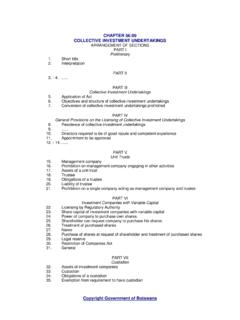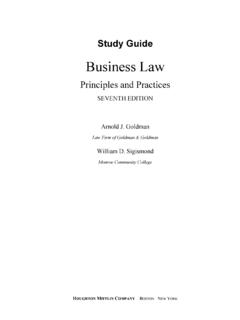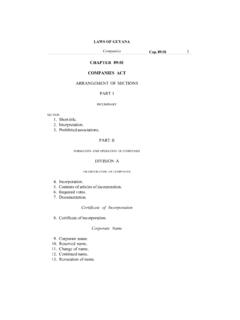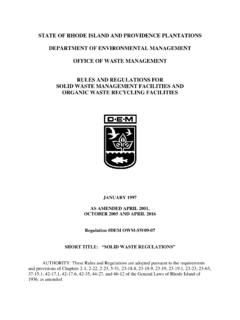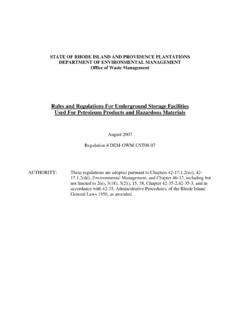Transcription of B. LIMITED LIABILITY COMPANIES AS EXEMPT ... - irs.gov
1 B. LIMITED LIABILITY COMPANIES AS EXEMPT ORGANIZATIONS UPDATE by Richard A. McCray and Ward L. Thomas 1. Introduction This article updates last year's article at 2000 CPE 111, which discussed the state laws governing LIMITED LIABILITY COMPANIES ( LLCs ), federal tax treatment generally, and issues regarding their use as EXEMPT organizations (focusing on IRC 501(c)(3)). The Service has developed an approach for dealing with such LLCs. This article discusses recent developments in the area and issues still pending with respect to LLCs, again with the focus on IRC 501(c)(3). 2. Disregarded Entities A. Ann. 99-102 The question was posed in last year's article whether an LLC can be EXEMPT as a disregarded part of an EXEMPT organization that is the sole owner of the LLC.
2 The Service has determined that it can. Ann. 99-102, 1999-43 545, establishes that an LLC wholly owned by a single EXEMPT organization ( EXEMPT under IRC 501(a)) may be disregarded as an entity separate from its owner. Under Reg. (b)(1), an eligible entity (which includes most LLCs) with a single owner is disregarded unless it elects otherwise. There are two ways for the eligible entity to elect separate entity treatment: by filing for separate entity treatment on Form 8832 (Reg. (c)(1)(i)), or by claiming exemption as an entity separate from its owner, as by filing a separate Form 1023 or Form 990 (Reg. (c)(1)(v)(A)).
3 In the latter case, the eligible entity is treated as having made the election for the period it claims exemption or is determined to be EXEMPT . Ann. 99-102 requires the EXEMPT owner of a disregarded LLC to treat the operations and finances of the LLC as its own for tax and information reporting purposes. In addition, the new Form 990 (Part IX) solicits information relating specifically to disregarded entities. LIMITED LIABILITY COMPANIES as EXEMPT Organizations Update B. IRC 508 The notice requirements under IRC 508 apply to a disregarded entity in the same manner as to a subordinate organization in a group exemption.
4 See Situation 3 of Rev. Rul. 90-100, 1990-2 156. C. Organizational Test The question was posed in last year's article whether a disregarded entity's articles of organization must satisfy the 501(c)(3) organizational test. The Service currently does not require that the articles independently satisfy the test: because the entity is treated as an activity of the owner, it is the owner's articles that matter. However, nothing in the disregarded entity's articles should prohibit the entity from operating exclusively for EXEMPT purposes. For instance, a provision allowing a disregarded LLC to operate "for all purposes for which LLCs may be operated" would be permissible.
5 A provision that "the remaining assets upon dissolution are to be distributed to the members of the LLC" would be permissible, because the sole member is qualified under IRC 501(c)(3). Where the disregarded LLC s articles do not satisfy the 501(c)(3) organizational test, the examining agent or determination specialist should closely scrutinize the past and planned activities of the LLC to ensure that the entire entity (including the disregarded entity) complies with the 501(c)(3) operational test. D. Charitable Deduction Ann. 99-102 clearly allows the disregarded entity to be treated as part of its EXEMPT owner for purposes of subchapter F (IRC 501 et seq.)
6 , chapter 42, and information and UBIT reporting purposes. However, the Service is considering whether the same treatment applies for purposes of IRC 170. If not, then a contribution to a disregarded entity would not be deductible as a charitable contribution unless the disregarded entity either qualified in its own right under IRC 170(c), or it qualified as an agent of the EXEMPT owner under the facts and circumstances. Guidance on this issue will be forthcoming in the near future. E. Employment Taxes Another guidance project of the Service involves employment taxes. In Notice 99 6, 1999-3 12, the Service solicited public comment regarding issues related to employment tax reporting and payment by disregarded entities.
7 Currently, disregarded entities are still allowed to choose between regarded or disregarded status for employment tax purposes. 28 LIMITED LIABILITY COMPANIES as EXEMPT Organizations Update F. Disregarded as Entity but Not as Activity Where an applicant for recognition of exemption indicates that it is or intends to be the sole owner of a disregarded LLC, the governing documents and information regarding the LLC's activities and finances should be obtained and reviewed. The LLC may be disregarded as a separate entity, but should not be disregarded as an activity. Special care should be taken to insure that disregarded LLCs are not used as a device to thwart the various rules governing EXEMPT organizations.
8 A disregarded LLC's operations may give rise to exemption problems, UBIT problems, or excise tax problems for the sole EXEMPT owner. 3. Regarded Entities (Associations) A. Partnership vs. Association Status One confusing concept is determining when an LLC (or other eligible entity) is treated as a partnership. The longstanding Service position is that a partnership cannot qualify under IRC 501(c)(3). However, an eligible entity (which may include an LLC or a partnership) that claims exemption as a separate entity is treated as an association, rather than as a partnership or disregarded entity, during the period in which it claims exemption or is determined to be EXEMPT (Reg.)
9 (c)(1)(v)(A)). B. 501(c)(3) Exemption for LLCs--12 Conditions Last year's article posed the question whether an LLC can qualify for exemption under IRC 501(c)(3) (other than as a disregarded entity with a sole EXEMPT organization owner). The Service has determined that it can, under certain conditions. The Service will recognize the 501(c)(3) exemption of an LLC that otherwise qualifies for exemption if it satisfies each of the 12 conditions below. The conditions are designed to ensure that the organization is organized and will be operated exclusively for EXEMPT purposes and to preclude inurement of net earnings to private shareholders or individuals.
10 1. The organizational documents must include a specific statement limiting the LLC s activities to one or more EXEMPT purposes. This requirement may be satisfied by standard purposes and activities clauses that satisfy the 501(c)(3) organizational test, such as "The organization is organized exclusively for EXEMPT purposes under section 501(c)(3) of the Internal Revenue Code," and "The organization may not carry on activities not permitted to be carried on by an 29 LIMITED LIABILITY COMPANIES as EXEMPT Organizations Update organization described in section 501(c)(3)." Taxpayers may not rely upon the cy pres doctrine to meet this requirement for LLCs.











